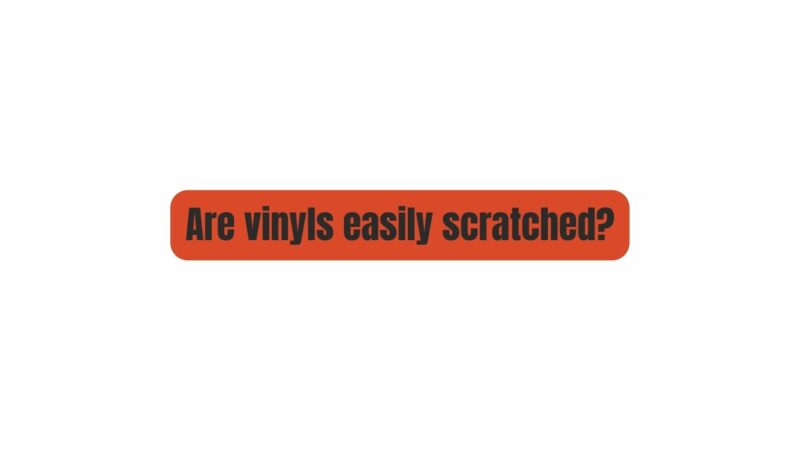The revival of vinyl records has taken the music industry by storm, captivating audiophiles and music enthusiasts alike. Yet, whether you’re a seasoned vinyl collector or a newcomer to the analog world, concerns about the durability of vinyl records and the ease with which they can be scratched often arise. In this article, we will delve into the question: Are vinyl records easily scratched? We’ll explore the physical characteristics of vinyl, the factors contributing to scratches, their impact on sound quality, and best practices for preserving your cherished vinyl collection.
Understanding Vinyl Records
To assess whether vinyl records are easily scratched, it’s crucial to grasp the fundamental properties of vinyl as a medium for storing music:
- Physical Grooves: Vinyl records store audio as physical grooves etched into the surface of the record. These grooves vary in depth and direction, encoding the analog audio information.
- Tactile Experience: Playing vinyl records offers a tactile and immersive listening experience, connecting the listener directly to the analog playback process and the physicality of music.
- Delicate Playing Surface: Vinyl records have a relatively delicate playing surface compared to digital media. Even minor imperfections or dust particles can affect playback quality.
Factors Contributing to Scratches
Scratches on vinyl records can occur due to various factors:
- Handling: Mishandling records, such as careless storage, improper placement of the stylus, or accidentally dropping the record, can result in surface scratches.
- Dust and Debris: Dust and debris present on the record’s surface can act as abrasives when the stylus traverses them during playback, causing scratches.
- Worn or Damaged Stylus: A worn or damaged stylus can dig into the grooves, creating deep scratches over time.
- Cleaning Practices: Cleaning records with abrasive materials or excessive force can introduce scratches.
Are Vinyl Records Easily Scratched?
The answer to whether vinyl records are easily scratched is nuanced. While vinyl records are more susceptible to physical damage compared to digital media, it’s essential to distinguish between minor surface imperfections and deep, severe scratches:
- Surface Scratches: Vinyl records are susceptible to surface scratches, which are typically minor and often result from normal wear and tear. These surface imperfections should not be mistaken for significant damage. Minor surface scratches are considered normal and should not significantly affect sound quality.
- Deep Scratches: Deep scratches, on the other hand, can have a more pronounced impact on sound quality. They may result in audible pops, clicks, and distortion during playback, which can detract from the overall listening experience.
In essence, vinyl records are not inherently prone to deep scratches, but they can accumulate surface imperfections over time, which are generally considered a normal part of the analog experience.
Preventing and Managing Scratches
To ensure the longevity of your vinyl collection and minimize the risk of scratches, consider the following preventative measures and maintenance practices:
- Proper Handling: Always handle records with clean hands, holding them by their edges to avoid touching the playing surface.
- Storage: Store records upright in protective sleeves and away from direct sunlight, heat, and extreme temperature fluctuations.
- Cleaning: Regularly clean your records using an anti-static brush, carbon fiber brush, or a record cleaning machine to remove dust and debris.
- Stylus Maintenance: Maintain a clean and healthy stylus, ensuring it is aligned and tracking correctly to minimize the risk of damaging your records.
When to Be Cautious
While minor surface scratches are generally considered normal and tolerable, there are instances when caution is warranted:
- Deep Scratches: Records with deep scratches that significantly impact sound quality or tracking may benefit from professional restoration or may need to be retired from regular use.
- Valuable Records: For valuable or rare records, take extra precautions to minimize wear and consider professional restoration when necessary.
Conclusion
The question of whether vinyl records are easily scratched comes down to the distinction between minor surface imperfections and deep, damaging scratches. While vinyl records are more susceptible to surface wear compared to digital media, deep scratches are not inherently common.
The joy of vinyl records extends beyond their potential imperfections. The tactile experience, the nostalgia, and the analog warmth they provide continue to captivate music enthusiasts worldwide. By understanding the nature of scratches and implementing proper handling and maintenance practices, you can ensure that your vinyl collection remains a treasure trove of musical enjoyment for years to come, with surface imperfections being a part of the journey rather than a deterrent.


